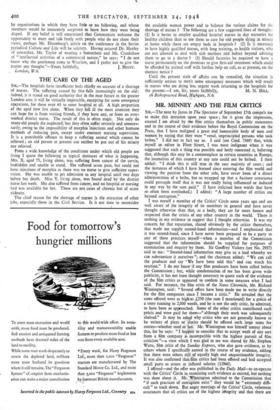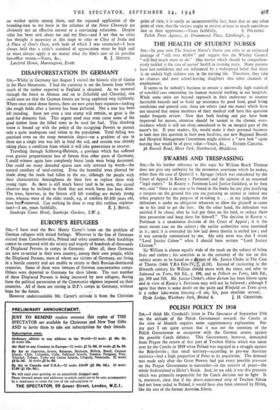MR. MINNEY AND THE FILM CRITICS
Sift,—The note by Janus in The Spectator of September 17th compels me to make this intrusion upon your space ; for it gives the impression, created I am afraid by the film critics themselves in public statements and in the course of their evidence before the Royal Commission on the Press, that I have maligned a great and honourable body of men and women by saying that they were "venal, unprincipled persons who took bribes." I did not in fact say so. I said (see Cmd. 7369) that, while myself an editor in Fleet Street, I was most indignant when it was suggested that such a thing was possible and hotly contested it, believing that, although this may be a commonplace in certain countries in Europe, the journalists of this country at any rate could not be bribed. I then added: "I think this is still true in the vast majority of cases ; and the instances of which I have learned since entering the film world and viewing the position from the other side, have never been of a direct administration of a bribe, but so wrapped up that a hesitant conscience could persuade itself that it was not really being influenced or induced in any way by the sum paid." (I have italicised here words that have so often been overlooked.) I added: "A large number of critics are beyond corruption."
I was myself a member of the Critics' Circle some years ago and am well aware of the integrity of its members in general and have never thought otherwise than that, as a body, they are far more honest and respected than the critics of any other country in the world. There is nothing in my evidence to suggest that I thought otherwise. It was my concern for that reputation, shared obviously by the critics themselves, that made me supply second-hand information—and I emphasised that it was second-hand, since I have never been prepared to be a party to any of these practices myself—when a member of the Commission suggested that the information should be supplied for purposes of examination and enquiry by them. Sir Geoffrey Vickers (see No. 2937) said to me: "Second-hand information may give us a lead whereby we can substantiate it ourselves "; and the chairman added: "We can call the producer and say 'We have been told this' and can watch his reaction." I do not know if any film producers have been called before the Commission ; but, while condemnation of me has been given wide publicity, it has not been thought necessary to quote such of the evidence of the film critics as appeared to confirm in some measure what I had said. For instance, the film critic of the News Chronicle, Mr. Richard Wirmington, said: "Several offers have been made me to write directly for the film companies since I became a critic." He revealed that the sums offered were as Melbas £250 (the sum I mentioned) for a precis of a story running to 2,000 words, and he is not the only critic, he admitted, to have been so approached. Some of the other critics contributed such précis and were paid for them—" although their work was subsequently shelved." It may be askefl why critics who are not generally known to be writers of plays or stories should be offered such large sums for stories—whether used or not. Mr. Winnington was himself uneasy about this, for he says: "1 happen to consider that to accept work of any sort from a film company is incompatible with the highest pursuit of film criticism "—a view which I was glad to see was shared by Mr. Stephen Watts, film critic of the Sunday Express, who also gave evidence, as by others whom I specifically named in the course of my evidence, adding that there were others still of equally high and unquestionable integrity. It was also confirmed thatAlm critics had been offered and had accepted small parts as actors at inflated salaries (12960).
I offered—and the offer was published in the Daily Mail—to co-operate with the Critics' Circle in examining such evidence as existed, but nothing was done about it. Mr.'Wirmington admitted to the Commission that "if such practices of corruption exist" they would be "extremely diffi- cult" to track down. But angry meetings of the Critics' Circle, vehement assurances that all critics are of the highest irftegrity and that there are no weaker spirits among them, and the repeated application of the branding-iron to my brow in the columns of the News Chronicle are obviously not an effective answer or a convincing refutation. Despite what has been said about me and my films—and I see that no critic has thought it necessary at this stage to refer to Clive of India and A Place of One's Own, with both of which I was connected—I have always held that a critic's standard of appreciation must be high and he must always apply it no matter what the film's cost or its possible



































 Previous page
Previous page